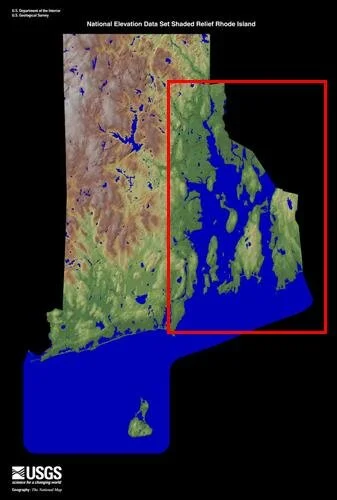Grace Kelly: What's meant by the 'blue economy'?
The area within red is Narragansett Bay.
From ecoRI News (ecori.org)
Blue is the new green.
The term “blue economy” has been popping up in headlines and economic outlines with increasing frequency during the past 10 years. But what exactly does blue economy mean? And what does it specifically mean for Rhode Island, the self-proclaimed Ocean State? And, to further complicate matters, what does it mean in a COVID-19 world?
A report released in March by the University of Rhode Island Graduate School of Oceanography, URI’s Coastal Resources Center, and Rhode Island Sea Grant attempts to answer the first two questions — the coronavirus pandemic hadn’t yet emerged during the report’s research period.
Jennifer McCann, director of coastal programs at the Coastal Resources Center, said that state government asked her team to define Rhode Island’s blue economy.
“So I Googled it, of course, and you get the definition from the U.N. and from other big, global programs and from different countries, and then you look at the definitions from different states like California and Michigan, and then you can go down further, and even Cape Cod has a definition of the blue economy,” she said. “Then our team looked at what data was out there, and we interviewed more than sixty people to figure out what they thought Rhode Island’s blue economy is, and so now we have a different definition than anyone else.”
Turns out Rhode Island’s blue economy, which the report defines as “the economic sectors with a direct or indirect link to Rhode Island’s coasts and ocean — defense, marine trades, tourism and recreation, fisheries, aquaculture, ports and shipping, and offshore renewable energy” — has a boatload of potential.
According to the 86-page report, 6 percent to 9 percent of Rhode Islanders work within the state’s ocean-based economy, which is valued at more than $5 billion.
Each sector listed in the report’s definition brings its own strengths to the table.
Ocean-based tourism raked in a whopping $703.6 million in 2018.
According to a 2019 study by Bryant University, the shipping industry at the Quonset Business Park generates nearly 7 percent of the state’s gross domestic product.Narra
The defense industry in Rhode Island uses certain areas of Narragansett Bay as testing grounds for new underwater technologies.
“The U.S. Navy owns an underwater tracking range located in Narraganset Bay. It is a testbed for undersea technology prototypes,” Molly Donohue Magee, executive director of the Middletown-based Southeastern New England Defense Industry Alliance, wrote in an email to ecoRI News. “The Naval Undersea Warfare Center has hosted an annual event, Advanced Naval Technology Exercise (ANTX) where companies can demonstrate their technology and prototypes to Navy engineers and the fleet.”
She goes on to note that ocean technology is the next big thing, and it will provide the state with an opportunity to strengthen its blue economy.
“Rhode Island is the hub of undersea technology,” she wrote. “It’s the home of the Naval Undersea Warfare Center, the Department of Defense’s research laboratory for undersea technology. There are many companies in Rhode Island and the region with unique technology related to the undersea environment. The ocean is the next frontier.”
Catherine Puckett is the owner of the Block Island business Oyster Wench, a shellfish and kelp farm operation. (Coastal Resources Center)
Deep blue economy
In addition to the obvious sectors of the blue economy, McCann made sure to note there are parts of it that might not seem so apparent, like advocacy groups such as Save The Bay or state agencies such as the Coastal Resources Management Council (CRMC).
“[Y]ou can’t forget about the marine-focused advocacy and civic groups,” McCann said. “And then you look at the role our government agencies have been playing whether it be Real Jobs RI working directly with marine trades and defense and building capacity, or CRMC who is designing our coast so we can have a pristine environment as well as a working waterfront.”
A big takeaway from the recent report, as well as from the state’s most-recent long-term economic development plan, which was approved in January, is that there is room for improvement.
During a January Rhode Island Commerce Corporation meeting that discussed the long-term economic development plan, titled Rhode Island Innovates 2.0 and written by Bruce Katz, Gov. Gina Raimondo is quoted as saying, “Basically, his analysis is: ‘Listen, you’ve made a lot of progress the past few years. But still a relatively small portion of our economy is what I would call advanced — high wage, high skill.’”
The governor went on to say that the state needs to do more to advance the education and skill of the average Rhode Islander.
Tide is high
While growing the blue economy was already seen as somewhat of an uphill battle, the coronavirus pandemic has thrown another obstacle in the way.
For instance, as of April 24, Discover Newport, a nonprofit dedicated to promoting the city of Newport and its ocean-centric tourism industry, had laid off 18 of its 22 employees, and expects to see a fall in annual revenue from $3.7 million to a little over a $1 million.
A variety of organizations that fall within the blue economy, such as Rhode Island Marine Trade Association, the Rhode Island Hospitality Association, Polaris MEP, and the Southeastern New England Defense Industry Alliance, have recently banded together to try to revive the economic momentum lost.
For McCann, this collaboration was always essential to a thriving blue economy, even before the virus took its economic and public-health toll.
“We need to work together,” she said. “That’s the way we are going to sustainably grow our state. If we just focus on economics or higher-ed, we’re not efficiently moving forward for sustainable growth in our state.”
Grace Kelly is an ecoRI News reporter.
